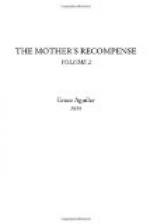It was the amusement of the village gossips for many a long evening to discuss over and over again the various merits of the two brides; some preferring the tearful, blushing Lilla, others the pale, yet composed and dignified demeanour of Miss Manvers. Some said Captain Fortescue looked much more agitated than he did when he saved his uncle’s life off Dartmouth, some years before; it was marvellously strange for a brave young officer such as he, to be so flustered at such a simple thing as taking a pretty girl for better or worse. And Mr. Percy Hamilton, some said, was very much too serious for such a joyous occasion; if they had been Miss Manvers they should not have liked it, and so unlike himself, too.
“Hold your tongue, silly woman,” a venerable old man interposed, at this part of the conversation, “the poor lad’s thoughts were with his brother, to whom this day would have been as great a source of joy as to himself. He has not been the same man since dear Master Herbert’s death, and no wonder, poor fellow.”
This observation effectually put an end to the remarks on Percy’s demeanour, and some owned, after all, marriage was somehow a solemn ceremony, and it was better to be too serious at such a time than too gay.
Percy and his bride stayed a week in London, and thence proceeded to Paris, which place, a very short scrutiny convinced Percy was internally in no quiet condition; some disturbance, he was convinced, was threatening, though of what nature he could not at first comprehend. He had not, however, left England a fortnight before his family were alarmed by the reports which so quickly flew over to our island of that extraordinary revolution which in three short days completely changed the sovereign dynasty of France, and threatened a renewal of those horrors which had deluged that fair capital with blood in the time of the unfortunate Louis XVI. We have neither space nor inclination to enter into such details; some extracts of a letter from Percy, which Mr. Hamilton received, after a week of extreme anxiety on his account, we feel, however, compelled to transcribe, as the ultimate fates of two individuals, whose names have more than once been mentioned in the course of these memoirs, may there perhaps be discovered.
“Your anxiety, my dearest mother, and that of my father and Ellen, I can well understand, but for myself I had no fear. Had I been alone, I believe a species of pleasurable excitement would have been the prevailing feeling, but for my Louisa I did tremble very often; the scenes passing around us were to a gentle eye and feeling heart terrible indeed, and so suddenly they had come upon us, we had no time to attempt retreat to a place of greater safety. Cannonballs were flying in all directions, shattering the windows, killing some, and fearfully wounding many others; for several hours I concealed Louisa in the cellar, which was the only secure abode our house presented. Mounted guards, to the number of six




